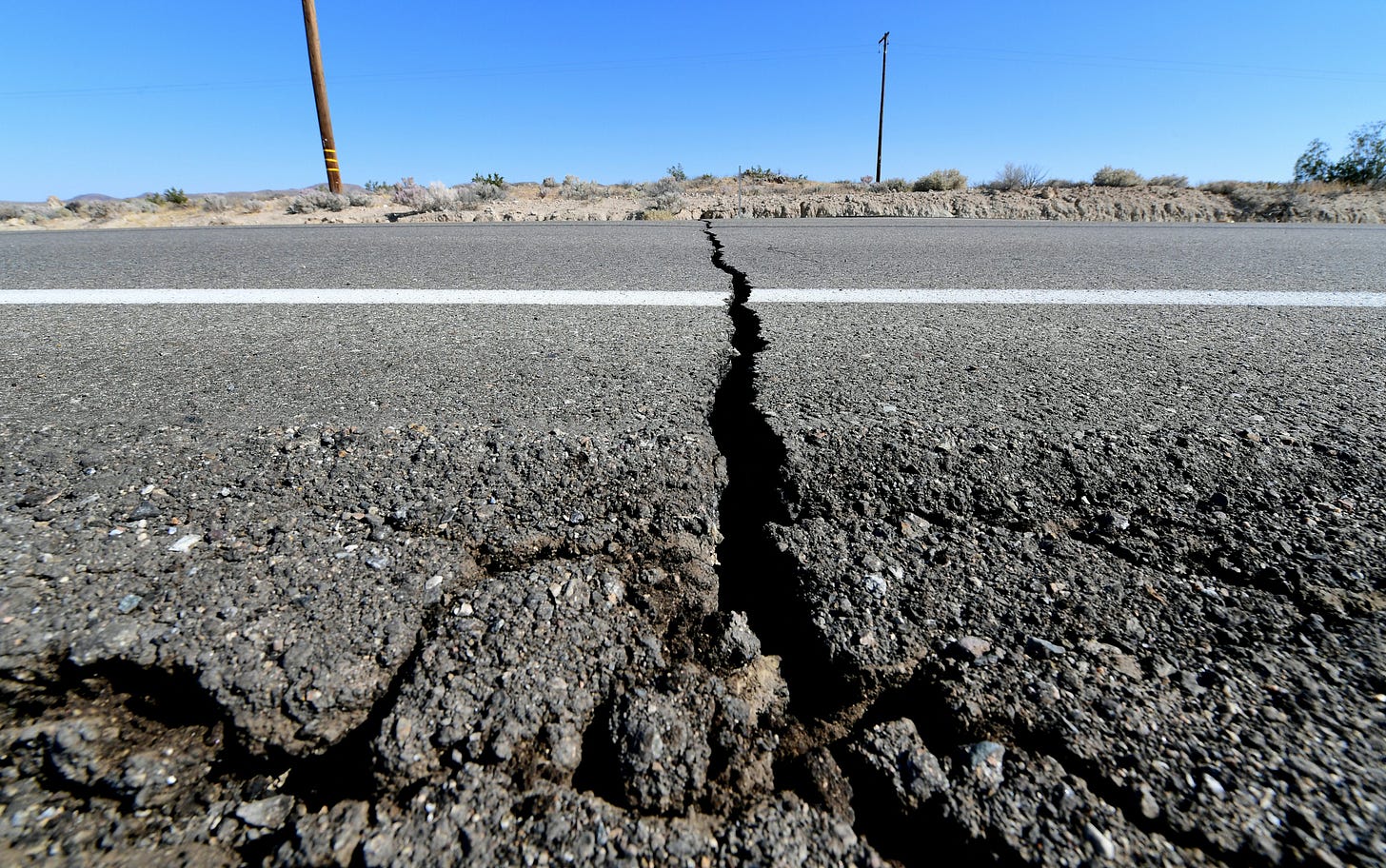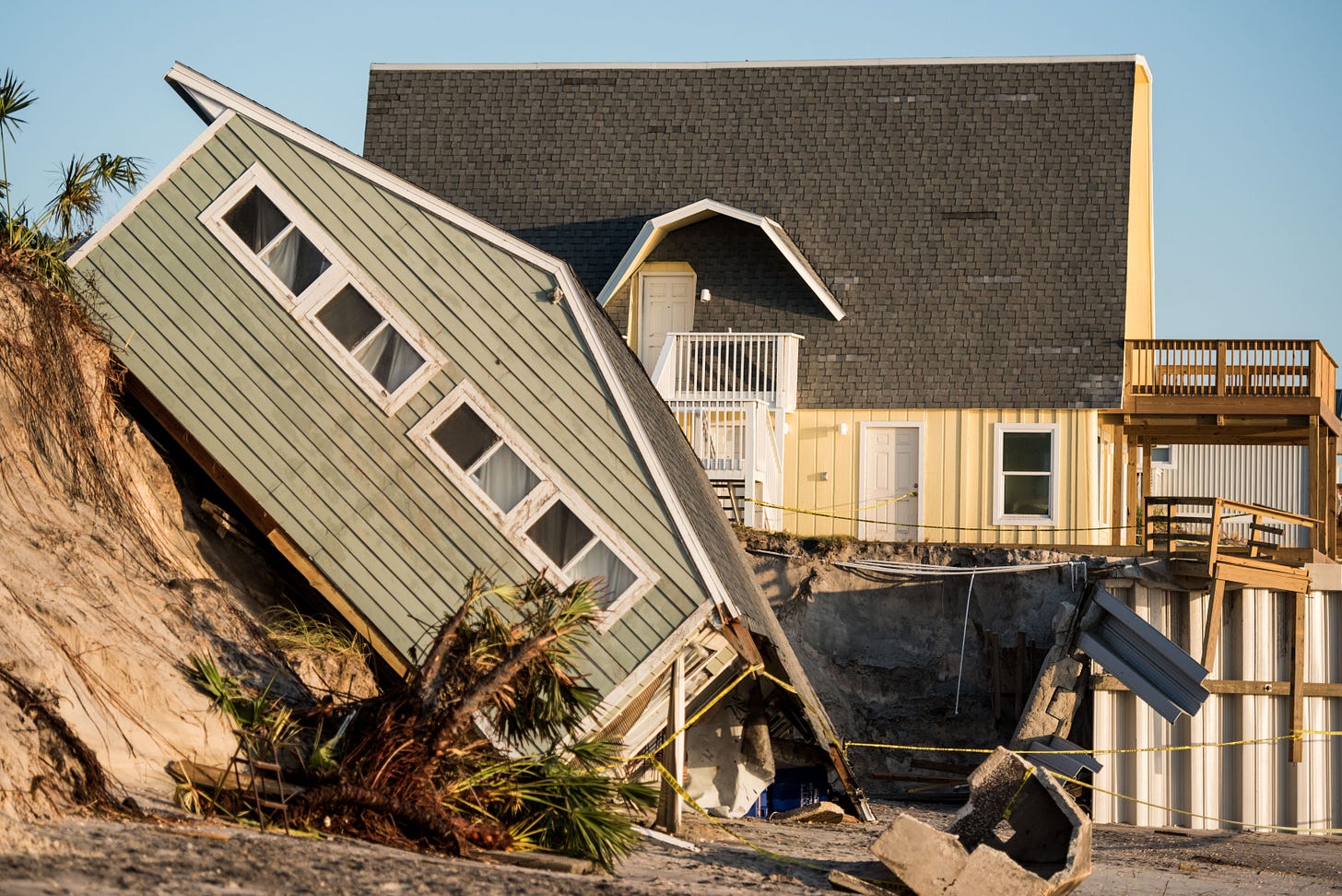Fragility Is Getting Scary
The opposite of risk management.
People who manage risk for a living know that their job is not to predict the future. Rather, their job is to be ready for the inevitable unpredictability. Strengthen defenses everywhere. Hedge your bets. Make systems as robust as possible. We will always be surprised by what the next disaster is, but we should never be surprised that there is a disaster. This is the distillation of thousands of years of wisdom—the concept of antifragility. Shit happens. Be prepared for whatever.
A remarkable thing about the Trump administration’s management of our country is the extent to which they are practicing the opposite of this maxim. Always and everywhere, they are introducing more fragility into our systems. They are making us more vulnerable on virtually every front. Their reign is chaotic, and being unable to know exactly what the worst crisis will be can leave us feeling adrift. But the most important—and disturbing—conclusion about our time is, in fact, perfectly knowable: When you make a system increasingly fragile, it is sure to break when the test does arrive.
The administration’s institutional climate change denial and decimation of weather forecasting capabillities and of FEMA has made us more vulnerable to both the long term consequences of climate change and the immediate damages of the next big hurricane, earthquake, flood, or other natural disaster. We will be less able to predict what is coming and less able to offer relief to victims and less able to rebuild quickly and efficiently.
The decimation of the CDC and of public health budgets has made us more vulnerable to the next infectious disease outbreak, pandemic, or other public health emergency. We will be less able to prevent the emergency, less able to contain it, and less able to treat its victims. It will take longer to bring it to an end and the amount of death and suffering will be much larger than it would otherwise. To contemplate something like Covid happening with the systems and personnel and media and political environment we have in 2025, as opposed to what we had in 2020, is terrifying.
The political purge of our foreign and domestic security, intelligence, and diplomatic agencies, and the installation in those agencies of leaders selected for loyalty rather than competence, has made us more vulnerable to all sorts of manipulation and attacks by foreign governments. The petulance, immaturity, and narcissism of the Commander in Chief of our armed forces introduces an unprecedented level of risk of hair-trigger bad decisionmaking to accompany our dissipating geostrategy. The end of the American empire may turn out to be a good thing, in the grand sweep of history, but the version of it now on the table is not rational managed decline. It is, instead, a turning-up of the risk dial that makes war, terrorism, and nuclear brinksmanship more plausible.
These are a handful of the many possible examples of what can go wrong. Reasonable people trying to plan for the future will make a list of the most probable types of crises—like the things named above—and dedicate the most resources to preparing for the most likely. The United States is doing the opposite. We are tearing down the biggest guardrails in the most obvious areas and pretending that there was no reason for them to exist in the first place. Obviously, this is a recipe for relearning why they existed in the first place. Nowhere is this more evident than in the case of our booming economy.
The bull market in US stocks officially turned three years old yesterday. The market has risen by 83% since October of 2022. Most of those gains have accrued to the wealthiest Americans, who own the vast majority of stocks. (This has not stopped the oligarchs who have gained the most from dutifully echoing Donald Trump’s hysteria about a nation going to hell, and offering political support to his program of oppression of various scapegoats.) Today, the market’s gains have become concentrated in a tiny number of tech and AI-focuse megastocks. This concentration makes the market’s health unusually susceptible to any disruption of either the real economic prospects of these few companies, or the public perception of their prospects.
As is often the case, the stock rally has drawn in a large pool of small time investors. A new survey shows that for the first time ever, a majority of people with incomes between $30K-$80K per year have personal investment accounts. Regular people see the gains and want to participate in them. The Wall Street term for this group of people is “dumb money.” During a bull market, everything goes up, making it easy for new investors to believe that they have skill. This belief draws in more money, fueling further market increases. This also means that when the rally hits a wall and the bubble bursts, the pain is more widespread.
Though all presidents find themselves, to some degree, at the mercy of global financial markets that they don’t really control, the Trump administration is unique for the degree to which it seems to be making every decision that is guaranteed to make our markets more risky, less controllable, and more prone to meltdown. Banking regulations put in place after the 2008 recession are being rolled back. Pro-consumer financial transparency is being gutted, both by statute and by the destruction of agencies like the Consumer Financial Protection Bureau. The White House itself is pumping up crypto, the asset class sure to blow up first and most spectacularly. The administration’s attack on the agency that produces economic statistics is the crudest tell of all, a flashing neon sign that corruption is the only plan. The smarter investment money is already fleeing the US in favor of international stocks as fast as possible.
When the bull market does end and the next recession does hit, it is not hard to predict what this administration will do. They will strongarm an end to the independence of the Federal Reserve in order to get it to lower interest rates, trying to temporarily paper over the damage, like shooting amphetamines into a dead tired man instead of letting him sleep. They will deny and be deceptive and try to hide the extent of the problem, wiping out as much financial transparency as they can, thereby causing more uncertainty and exacerbating the situation. And they will pursue their campaign of distraction with more urgency than ever, frantically demonizing immigrants and political opponents and other disfavored groups even more than they are now, with all of the attendant awful human rights abuses that will go with that.
Because none of these responses will in fact fix the substance of the underlying problem, it is a good bet that the next financial crisis and recession will be a particularly ugly one—economically, politically, and in the sheer quantity of destruction of American power and prestige in the world.
This is not a complete list of the risks that America faces. Indeed, it is always wise to bet that the next acute crisis will be one that nobody was betting on in the first place. The point is that we are, unfortunately, under the control of a group of goons notable for their determination to make everything as fragile as possible. Systems, organizations, cultures, and institutions that may have been able to withstand literal or metaphorical storms are becoming more and more likely to crumble the next time they are tested. This is a problem deeper than surface-level partisan political disagreements. It is the result of a very long epidemic of selfishness and cowardice in public life, a hollowness at the heart of our rhetoric about democracy that has, at last, ushered in a chaos agent that will make us pay for all of it at once.
These are not the kind of wounds that are easily recovered from. This is more like aging, a deep, comprehensive process of weakening that cannot be reversed. If you read the history of America, you will be struck by how many times we have faced incredibly severe social, political, and economic crises, and how we have, gobsmackingly, pulled through them to become the richest and most dominant nation in the history of the world. In general, it is foolish and short-sighted to believe that whatever the current challenges are in our current times are sure to spell doom for the whole American experiment. Those who imagine that to be true have been wrong for more than 200 years. But, at the risk of being a fool myself, I will make one prediction: We are living through the beginning of the end of the American age of dominance. The country will survive, but our era as the world’s mighty rulers is over. We will look back on today as the time just before our wanton, excessive fragility went too far. Fragile things break. Sooner or later, they break.
More
Related reading: Scams and Bribery Are Becoming the Foundation of Our Economy; Crypto, as a Political Characteristic; What Is Centrism?
Does fragility mean nihilism? No it does not. The future is unwritten. There are going to be nationwide protests on October 18, and we should all be there. You should join an organization, run for office, build a co-op, unionize your workplace. I wrote a book about one path to salvation. Mostly just: Get out the house and build something good not bad. Also yell at fascists every day, everywhere.
Bias alert: I think it is also important to support independent media. If the billionaires control the biggest news outlets and all the algorithms, it’s hard for the public to get a good view of what’s going on. This site that you are reading, How Things Work, is one small part of that independent media. This place exists solely thanks to the financial support of readers just like you, who pay six bucks a month or $60 a year to help us keep going, and to enjoy the good karma that comes with it. If you like reading How Things Work, and you have some disposable income, I hope that you’ll seriously consider clicking the button below to become a paid subscriber right now. If you can’t afford it, just keep coming back. This site is free for everyone to read.




Feels like a pretty significant shift in uhh.. well we aren't supposed to say "vibes" anymore, but in the last couple weeks the people ringing the alarm bells on the bubble economy have gone from the outsider freaks and heterodox economists, to like, Bloomberg and FT. People at my work now talk about an economic bubble like it's accepted common sense. Feels weird, sky is getting green, tornado weather.
Related to the FEMA piece, as FEMA's limited resources rendered it ill-equipped to handle disasters during the Biden administration and things have gotten even worse under Trump:
Wrote a whole thing about my family and I's Hurricane Helene experience and erased it by accident, but it was a nightmare situation (ran out of food, bf and I got stranded in my car, stuck in one area with no way to leave) that felt like living in a post-apocalyptic hell for 36 hours, and it was sobering to realize how ill-equipped we are as a country to handle natural disasters. Was also living in Texas during the 2021 snowstorm, which was another holy shit experience, and we're only going to have more of them due to climate change.
But yeah, sure, let's just throw up some more data centers so people can use our planet's limited resources to generate slop videos of Stephen Hawking on a half pipe.